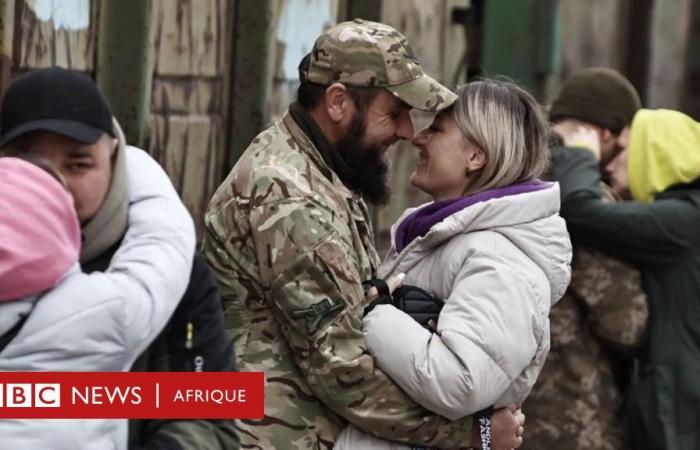
Photo credit, Getty Images
- Author, Ilona Hromliuk
- Role, BBC News Ukraine
-
8 minutes ago
A woman in high heels hugging and kissing a man in a military uniform may sound like a scene from a World War II movie, but in eastern Ukraine it has become part of everyday life.
As the all-out Russian invasion of the country approaches its third anniversary, the toll of the war is mounting not only for the Ukrainian soldiers fighting on the front lines, but also for their wives waiting for them at home.
Oksana and Artem had been married for 18 months when the war broke out, and Artem joined the Ukrainian army.
They dreamed of having a child, but Artem was only allowed to take short leaves from time to time.
So Oksana had no choice but to travel hundreds of kilometers from her hometown of Bila Tserkva, near the capital kyiv, to the Kharkiv region and then to the Donetsk region in the east. from Ukraine, where her husband was stationed, just to spend some time with him.
Their first “date” took place in April 2022. Their second – in November of the same year. Artem was injured at the time and Oksana had just suffered a miscarriage.
She began making these trips more regularly, determined to conceive a baby, although her husband worried about her safety.
“I couldn’t imagine my life without seeing him,” Oksana told BBC News Ukraine. “Those were the only days I felt alive. »
The couple would find themselves in a village or town close to the front line and stay in a local house whose owners would often offer them a night’s stay for free. These houses had once been dwellings.
“You felt happy to be with your husband, but also sad to see photos of strangers around you,” says Oksana. “All these lives, ruined by the war.”
Rising Divorce Rates
Since the Russian invasion of Ukraine began in February 2022, family breakdown has been on the rise across Ukraine.
According to the United Nations, more than six million people have left the country, representing almost 15% of the pre-war population.
Most of those who have left the country are women and children, as martial law prohibits men aged 18 to 60 from leaving Ukraine.
Soldiers serving in the military can only take 30 days of annual leave, with an additional 10 days granted for exceptional family circumstances.
With couples and families spending less time together, the birth rate has fallen dramatically.
In 1991, the year the Soviet Union collapsed and Ukraine gained independence, there were 630,000 births. The birth rate has continued to decline since then, falling to 309,000 in 2019. In 2023, a year after the start of the large-scale invasion, the birth rate reached a historic low for Ukraine, with only 187,000 births.
The number of divorces has also increased. According to the Ministry of Justice of Ukraine, in the first six months of 2024, the number of divorces increased by 50% compared to the same period of the previous year.
For many women, going to the front lines to date their husbands is the only way to save their marriage and keep their family together.
Service obligation
The journey to the front line is a difficult journey, several hundred kilometers long, which carries many risks.
Women often choose to take the train to a nearby town and then take the rest of the way by bus or taxi.
They sometimes spend more time on the road than expected, because a soldier is only allowed a short break when not officially on leave.
Natalya left Lviv, in western Ukraine, for Kramatorsk, in the east of the country, to see her husband. The journey lasted 1,230 km.
She spent more than two days (more than 50 hours) on the road, but was only able to see her husband briefly due to incessant bombing of five nearby border towns.
“We only stayed on the platform for 50 minutes, then he put me back on the same train that I had arrived on,” says Natalya, wiping her tears: “But those 50 minutes were worth it. »
Although the trip cost her about 5,000 hryvnias ($120; £95), almost a quarter of the average monthly salary in Ukraine, she says she tried to visit her husband every two or three months.
They have been married for 22 years and have two adult children.
“These trips are an opportunity to feel like family again,” she says.
Photo credit, Getty Images
Not all stories of couples dating near the front lines have a happy ending.
Some women make the dangerous journey to visit their partner only to discover that he has taken a mistress or “country wife” in a frontline town.
When Russia launched a proxy war against Ukraine in 2014, parts of eastern Ukraine were occupied. Maria’s husband (not his real name) was on the front line. She was leaving kyiv for three days to visit him in eastern Ukraine, but things quickly began to take a turn for the worse. Maria’s husband began to suffer from post-traumatic stress disorder (PTSD).
When he returned from the army, he began to be violent with Maria and their children, and eventually had affairs. They quickly divorced.
Now married to another soldier, Maria doesn’t particularly insist on traveling to go out with her husband.
“Meeting on the front line doesn’t save a family,” she said. “We can only save it if we have a common vision, if we can talk about our goals in life.
The wait is worth it
Back in Bila Tserkva, Oksana recently gave birth to a baby boy. She had suffered two miscarriages, and her firstborn is a much-anticipated addition to the family.
Oksana hoped that her husband Artem could be by her side during childbirth, but he was not given permission.
She told me shortly before the baby was born: “Of course, any woman would want her husband to be by her side at a time like this,” she said.
“But I’m carrying our child and I know my husband will be where he needs to be.”





